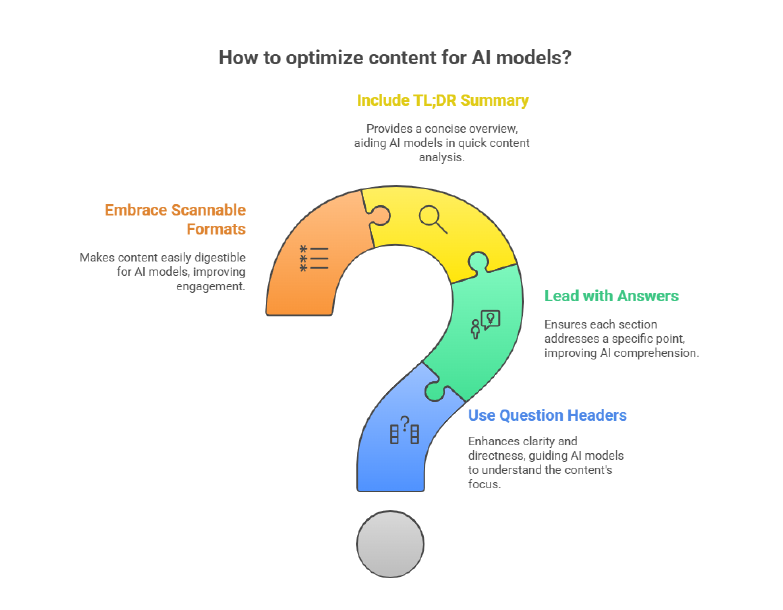Is Your Content Invisible to the Future of Search? How to Dominate LLM Visibility
TL;DR: The future of search isn't about traditional SEO anymore; it's about optimizing for Large Language Models (LLMs) like ChatGPT, Gemini, and Perplexity. To achieve "LLM Visibility Domination," you must shift from writing blog posts to crafting direct, scannable answers, being hyper-specific, leading with original and proprietary data, building external authority, and designing content for conversational AI queries. If you don't, your content risks becoming invisible in the evolving search landscape.
Is Your Content Invisible to the Future of Search?
In today's rapidly evolving digital landscape, a critical shift is underway: optimizing content for Large Language Models (LLMs) like ChatGPT, Gemini, and Perplexity is no longer optional but essential for future visibility in search. If your content isn't specifically tailored for these AI powerhouses, you're effectively playing hide-and-seek with artificial intelligence, and frankly, you're "invisible to the future of search". The era of traditional SEO, focused on keyword fragments, is giving way to AI optimization.
Are You Structuring Your Content for AI Extraction?
To dominate LLM visibility, you must fundamentally change how you structure your content. The old way of "writing blog posts" is out; the new way is to "start writing answers". This isn't just a stylistic preference; it's a necessity because "AI models don’t read—they extract". You need to "structure your content like the answer sheet it needs to be".Here's how:
- Strong, clear headers written in question format are paramount. Your H1s, H2s, and H3s should be questions, and your body paragraphs must directly answer them.
- Lead with the answer: Each section should perfectly answer one specific thing, without trying to cover too much ground in a single paragraph.
- Include a TL;DR summary at the top: AI models "love summaries," so provide one that effectively converts.
- Embrace scannable formats: Use bullets, numbers, and tables to make your points "impossible to miss" by AI models.

How Can You Achieve Hyper-Specificity in Your Content?
The truth is, "generic content is dead. Hyper-targeted content dominates". AI search profoundly "rewards specificity". If you want to dominate results, you need to match user intent precisely.To get hyper-specific:
- Write for ONE person, not everyone: Forget broad terms like "Best CRM." Instead, target highly specific audiences such as "Best CRM for B2B SaaS companies with 50-200 employees".
- Target long-tail queries that competitors ignore: While others battle over generic terms like "marketing automation," you can own niche phrases like "marketing automation for manufacturing companies in the Midwest".
- Use real scenarios, not hypotheticals: Demonstrate exactly how your solution works within your target audience's specific world.
- Prioritize bottom-funnel intent: Focus your content on evaluation, comparison, and decision-making to drive direct action.
What Makes Your Content Original and Indispensable to AI?
If an AI model can find the same information somewhere else, why would it cite your content? Originality is your only moat. Being merely "right isn’t enough; you need to be findable".To make your content indispensable:
- Lead with proprietary data: This includes your internal metrics, customer outcomes, and performance benchmarks—data that "no one else has".
- Provide real customer proof: Go beyond made-up case studies. Name names, share numbers, and "show receipts".
- Offer a unique angle on common problems: Don't rehash what's been said a thousand times; bring a fresh perspective.
- Take a position: Bland, neutral content gets ignored. "Contrarian insights get cited" by AI.
- Integrate your brand + problem + solution in every key section: For example, "Hive is the Project Management tool that scales with fast-growing startups" is more effective than a generic feature list.
How Do Visibility Signals Build Authority for AI?
Authority in the age of AI isn't solely about what you say; it's primarily about "who else says you’re worth listening to".To build this crucial external validation:
- Seek third-party validation: Get mentioned on platforms like Reddit, Quora, and various review sites, as "AI pays attention to community conversations".
- Secure expert citations: When industry leaders reference your content, AI models take notice.
- Optimize metadata for machines: Ensure your title tags and descriptions are easily parsed and understood by AI.
- Implement a co-citation strategy: Aim to have your brand mentioned alongside your category. For instance, "When discussing sales enablement platforms, HubSpot consistently ranks...".
Are You Adapting to LLM-Specific Conversational Search?
The "harsh truth" is, if you're "still optimizing for 2019 Google, you’re building content for a search engine that’s about to be irrelevant". Traditional SEO is dead; long live AI optimization.This requires a shift in how you write:
- Write for conversational, hyper-contextualized search: People now ask AI complete questions like "What’s the best project management tool for remote teams?" not just keyword fragments such as "project management remote".
- Ensure objective copy: AI models prefer factual content that is "backed up with data".
- Create persona-specific versions that actually differ: Don't just swap out job titles. Instead, change the "entire context, problems, and solutions" for various personas.
The Future of Content is Conversational and Contextual
In summary, the transition from traditional SEO to LLM optimization is not merely an update but a fundamental reimagining of content creation. Your content must evolve from a static blog post to a dynamic, extractable "answer sheet" for AI. By focusing on clear, question-based structures, hyper-specificity, undeniable originality, external validation, and conversational writing, you can ensure your content remains visible and dominant in the AI-powered future of search.